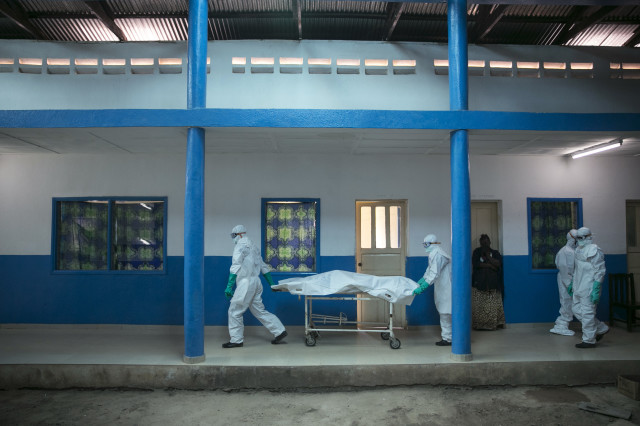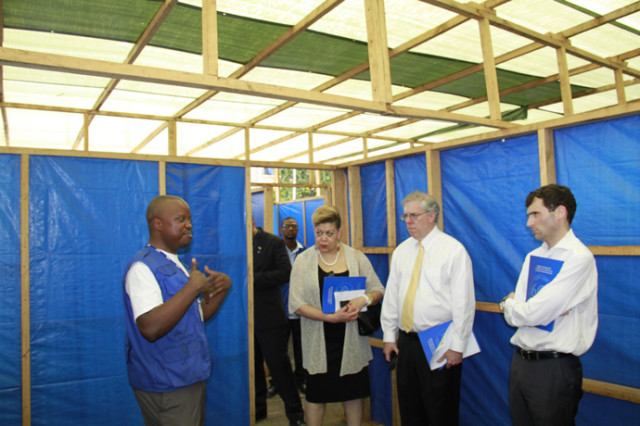Posted June 24th, 2015 at 10:42 am (UTC-5)
By Denise Rollins
USAID Impact Blog
Imagine being in a house with 15 family members, and watching them all gradually die from Ebola.
This was Gibril Kamara’s reality.
Last month in Sierra Leone, Gibril shared his harrowing ordeal with our visiting team from Washington, D.C. As the senior coordinator of USAID’s Africa Ebola Unit, I was traveling with USAID Associate Administrator Eric Postel and others in Liberia, Sierra Leone and Guinea — the three countries most affected by Ebola — to see USAID’s efforts on the ground, meet with officials, and hear from communities.
We met Gibril and three other Ebola survivors at the International Organization for Migration’s Ebola healthcare training center in Freetown. They told us their stories of resilience amid a devastating public health crisis.
Gibril recounted how at first his family members thought the symptoms they exhibited could have been caused by any number of diseases. However, Gibril knew the telltale signs of Ebola.
He pleaded with his family to go to a medical facility, but the patriarch of the family refused to allow them to leave. While the fear of stigma permeated the air, the patriarch insisted everyone stay at home and not seek outside help.
First, one sister died, then another, then uncles and aunts, and finally the patriarch himself.
Gibril decided he would not be next.

Health workers push a gurney with a dead body at a Red Cross facility in the town of Koidu in Sierra Leone, Dec. 19, 2014. (Reuters)
On the brink of succumbing to Ebola himself, Gibril made his way in a taxi to a hospital for medical care. With proper Ebola treatment and care, Gibril survived.
Although Liberia reached zero Ebola cases just days before my arrival in country, Sierra Leone and Guinea continue to see new cases weekly, and stories like Gibril’s are still common.
Through the Disaster Assistance Response Team (DART), USAID continues to work alongside partners in all three countries to fight the spread of the disease. After hearing Gibril’s story, I stood in the middle of an Ebola command center in Freetown and was awestruck by the vast number of people, computers and teams needed to respond to the Ebola outbreak. The extensive coordination required to contain and defeat the disease is daunting.
From the surveillance teams and the social mobilization groups who go door to door identifying people with fever, to the ambulance drivers, health care workers and safe burial teams, everyone must work in lockstep.
Such a complicated effort is not easy in the best of circumstances, but in three of the poorest countries in the world, where the people without electricity outnumber those that have it, effective coordination is a challenge. I doff my hat to the thousands of U.S. and local staff and volunteers who continue to work tirelessly.
Since August 2014, USAID has converged an unprecedented array of people, equipment and other resources to these Ebola-affected countries.
Thanks to the international community and local partners, we are easing the burdens of the citizens of these countries. As we work together to fight Ebola and lessen the secondary impacts of the outbreak, we are serving as an example of worldwide collaboration at its best.
Getting to zero Ebola cases is critical and the goal for USAID is helping these countries end the epidemic, get back on track, and be better prepared to stop any future outbreaks before they become epidemics.

Senior Ebola Coordinator Denise Rollins, Associate Administrator Eric Postel, and National Security Council Senior Advisor Chris Kirchhoff listen as a staff member from the International Organization for Migration provides a tour of a mock-Ebola treatment unit in Freetown, Sierra Leone. (courtesy of Kate Alexander/ USAID)
Weak health care systems suffered major setbacks during the Ebola outbreak, but now USAID is helping improve the ability to detect threats early, and respond rapidly and effectively to prevent the spread of Ebola and other viruses across borders.
In addition to support rebuilding and strengthening healthcare systems, we are also helping reopen schools and stimulate local food production.
Gibril’s world was turned upside down when he lost his entire family. However — like so many other Ebola survivors — Gibril was resilient.
Resilience is such an overused word, but it captures the spirit, commitment and dedication of the citizens of Liberia, Sierra Leone and Guinea to get back on their feet after this devastating public health crisis.
Many survivors, like Gibril and the others I spoke with at the National Ebola Training Academy, now volunteer their time as trainers, health care workers and social mobilizers — helping other patients recover from their battles with the virus, while spreading awareness about Ebola prevention. In turn, USAID will continue to support the people of West Africa. Ebola doesn’t disappear at zero, and neither will our fight to keep Ebola away.
Ebola Doesn’t Disappear at Zero and Neither Will We
By Denise Rollins
USAID Impact Blog
Imagine being in a house with 15 family members, and watching them all gradually die from Ebola.
This was Gibril Kamara’s reality.
Last month in Sierra Leone, Gibril shared his harrowing ordeal with our visiting team from Washington, D.C. As the senior coordinator of USAID’s Africa Ebola Unit, I was traveling with USAID Associate Administrator Eric Postel and others in Liberia, Sierra Leone and Guinea — the three countries most affected by Ebola — to see USAID’s efforts on the ground, meet with officials, and hear from communities.
We met Gibril and three other Ebola survivors at the International Organization for Migration’s Ebola healthcare training center in Freetown. They told us their stories of resilience amid a devastating public health crisis.
Gibril recounted how at first his family members thought the symptoms they exhibited could have been caused by any number of diseases. However, Gibril knew the telltale signs of Ebola.
He pleaded with his family to go to a medical facility, but the patriarch of the family refused to allow them to leave. While the fear of stigma permeated the air, the patriarch insisted everyone stay at home and not seek outside help.
First, one sister died, then another, then uncles and aunts, and finally the patriarch himself.
Gibril decided he would not be next.
Health workers push a gurney with a dead body at a Red Cross facility in the town of Koidu in Sierra Leone, Dec. 19, 2014. (Reuters)
On the brink of succumbing to Ebola himself, Gibril made his way in a taxi to a hospital for medical care. With proper Ebola treatment and care, Gibril survived.
Although Liberia reached zero Ebola cases just days before my arrival in country, Sierra Leone and Guinea continue to see new cases weekly, and stories like Gibril’s are still common.
Through the Disaster Assistance Response Team (DART), USAID continues to work alongside partners in all three countries to fight the spread of the disease. After hearing Gibril’s story, I stood in the middle of an Ebola command center in Freetown and was awestruck by the vast number of people, computers and teams needed to respond to the Ebola outbreak. The extensive coordination required to contain and defeat the disease is daunting.
From the surveillance teams and the social mobilization groups who go door to door identifying people with fever, to the ambulance drivers, health care workers and safe burial teams, everyone must work in lockstep.
Such a complicated effort is not easy in the best of circumstances, but in three of the poorest countries in the world, where the people without electricity outnumber those that have it, effective coordination is a challenge. I doff my hat to the thousands of U.S. and local staff and volunteers who continue to work tirelessly.
Since August 2014, USAID has converged an unprecedented array of people, equipment and other resources to these Ebola-affected countries.
Thanks to the international community and local partners, we are easing the burdens of the citizens of these countries. As we work together to fight Ebola and lessen the secondary impacts of the outbreak, we are serving as an example of worldwide collaboration at its best.
Getting to zero Ebola cases is critical and the goal for USAID is helping these countries end the epidemic, get back on track, and be better prepared to stop any future outbreaks before they become epidemics.
Senior Ebola Coordinator Denise Rollins, Associate Administrator Eric Postel, and National Security Council Senior Advisor Chris Kirchhoff listen as a staff member from the International Organization for Migration provides a tour of a mock-Ebola treatment unit in Freetown, Sierra Leone. (courtesy of Kate Alexander/ USAID)
Weak health care systems suffered major setbacks during the Ebola outbreak, but now USAID is helping improve the ability to detect threats early, and respond rapidly and effectively to prevent the spread of Ebola and other viruses across borders.
In addition to support rebuilding and strengthening healthcare systems, we are also helping reopen schools and stimulate local food production.
Gibril’s world was turned upside down when he lost his entire family. However — like so many other Ebola survivors — Gibril was resilient.
Resilience is such an overused word, but it captures the spirit, commitment and dedication of the citizens of Liberia, Sierra Leone and Guinea to get back on their feet after this devastating public health crisis.
Many survivors, like Gibril and the others I spoke with at the National Ebola Training Academy, now volunteer their time as trainers, health care workers and social mobilizers — helping other patients recover from their battles with the virus, while spreading awareness about Ebola prevention. In turn, USAID will continue to support the people of West Africa. Ebola doesn’t disappear at zero, and neither will our fight to keep Ebola away.